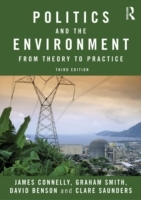Politics and the Environment has established itself as one of the most comprehensive textbooks in this area. This new edition has been completely revised and updated whilst retaining the features and the theory-to-practice focus which made the first two editions so successful. This text is designed to introduce students to the key concepts and issues which surround environmental problems and their political solutions. The authors investigate the people, movements and organisations that form and implement these policies, and explore the barriers which hinder successful introduction of international environmental politics.The 3rd edition has been expanded to include: The shift in focus in environmental politics from sustainable development to climate change governance An extensive discussion on climate change: including institutional, national and global responses in the aftermath of the Kyoto protocol An increased international focus with more case studies from the UK, Europe, Australia and North America More discussion of global environmental social movements: including the US environmental organisations, in particular the Green Party and the environmental justice groups This textbook is an invaluable and accessible resource for undergraduates studying environmental politics.


